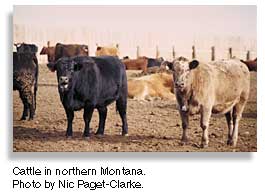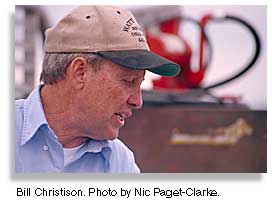|
by working with environmental groups" Family farm agriculture needs more allies in order to survive by Bill Christison, Albuquerque, New Mexico
My name is Bill Christison and I serve as president of the National Family Farm Coalition and the Missouri Rural Crisis Center I am a fourth generation family farmer from Chillicothe, Missouri, where we raise cattle, corn, and soybeans on our 2,000 acre farm. 1999 is an anxious year for family farmers, and a pivotal one. Annual net farm income has fallen by $12 billion since the 1996 farm bill was signed. The outlook for this year looks just as bleak; hog, cattle, wheat, soybean, and corn prices are projected to stay below cost of production levels all year long. The North American Free Trade Agreement has contributed to this price collapse, and ranchers, hog farmers, and wheat farmers have physically blocked trucks carrying imports from Canada. Unfortunately, the American Farm Bureau Federation (AFBF) strongly supported the 1996 Farm Bill, NAFTA, and corporate takeover of the hog and cattle industries, helping make the disaster we face today much worse than it would have been. At the same time, we work with Farm Bureau members at the grassroots level who are extremely concerned that their farms are in jeopardy, and they know that U.S. agriculture and trade policies must be changed. These Farm Bureau members are taking action at the county and state level to support public policies that promote the independent family farm agriculture that NFFC fights to maintain and strengthen. Yet these family farm voices, who often represent the majority of Farm Bureau members, are consistently ignored and opposed at the national level by the American Farm Bureau Federation.
We suspect that American Farm Bureau Federation opposes its own farmer members on critical issues because the AFBF places the interests of Farm Bureau insurance above the needs of its members. In any case, we hope that this year's convention will be productive for American Farm Bureau Federation, and hope that they will support Packers and Stockyards rules to foster competitive bidding in cattle markets, antidumping claims for cattle and other commodities, cattle price reporting, the rancher lawsuit against IBP, and the petition drive for a beef checkoff referendum, among other positions. Family farmers are in grave danger right now; we need support from the AFBF, and from as many sources as possible. Considering that family farm agriculture needs more allies in order to survive, NFFC is concerned that AFBF continues to antagonize environmental groups rather than focus on the causes of low farm prices. The main issue of contention between Defenders of Wildlife and the Farm Bureau is reintroduction of the grey wolf. At NFFC, we have never had a position on the issue, and will not attempt to persuade anyone with our limited expertise about the grey wolf. We do know from experience that people who care deeply about family farm agriculture all too often end up on opposite sides of environmental issues, and in the process farmers get separated from consumers who can be strong potential allies. Farmers have a tremendous amount to gain by working with environmental groups on important issues. Environmental groups have, for example, solidified their support of fair trade rather than free trade, helping us defeat fast track. Since we have defeated fast track, our government is under pressure to respond constructively to ranchers who are trying to stop cattle dumping from Canada. It is also important to remember the previously mentioned proposed rule to require competitive bidding for cattle supplies was drafted by the Western Organization of Resource Councils, a grassroots organization that unites ranchers and consumers working on farm and environmental issues. In 1999, farmers face the fight of our lives. We are less than 2% of the population and will not survive unless we form coalitions with other constituencies, as we did in our fight to defeat fast track. By targeting environmental groups, AFBF is only hurting family farmers' ability to make the alliances that they need to make. Even worse, squabbles with environmental groups distract farmers from organizing to create alternatives to the corporate takeover of agriculture that has slashed farm prices and is destroying our way of life. Right now, many farmers and environmentalists are pitted on opposite sides of a line drawn in the sand, and American Farm Bureau Federation is doing all it can to make sure that line takes on an exaggerated importance. We must overcome this divide in order to keep our farms. We urge the AFBF to redirect its energies from fighting consumers to fighting the corporations, farm policies, and trade policies that are keeping prices low. If the American Farm Bureau Federation will not fight for the interests of its family farmer members, then it is not really a farm group. Related articles: |
| Published in In Motion Magazine - March, 1999 |
If you have any thoughts on this or would like to contribute to an ongoing discussion in the  What is New? || Affirmative Action || Art Changes || Autonomy: Chiapas - California || Community Images || Education Rights || E-mail, Opinions and Discussion || En español || Essays from Ireland || Global Eyes || Healthcare || Human Rights/Civil Rights || Piri Thomas || Photo of the Week || QA: Interviews || Region || Rural America || Search || Donate || To be notified of new articles || Survey || In Motion Magazine's Store || In Motion Magazine Staff || In Unity Book of Photos || Links Around The World NPC Productions Copyright © 1995-2020 NPC Productions as a compilation. All Rights Reserved. |


 Bill Christison, president of both the U.S. National Family Farm Coalition and the Missouri Rural Crisis Center delivered this speech on January 11, 1999, in Albuquerque, New Mexico at a Press conference by the Defenders of WildLife about the practises of the American Farm Bureau.
Bill Christison, president of both the U.S. National Family Farm Coalition and the Missouri Rural Crisis Center delivered this speech on January 11, 1999, in Albuquerque, New Mexico at a Press conference by the Defenders of WildLife about the practises of the American Farm Bureau. Since the grey wolf is being reintroduced in cattle country, it is important to remember that AFBF has an especially poor record of supporting ranchers, including their own members, on cattle policies. In 1997, for example, the Wyoming, California, and North Dakota Farm Bureaus sent public comments to USDA in favor of a proposed rule it had published that would require meat packers to bid competitively for all cattle they acquire. County Farm Bureaus from several other states also wrote USDA in support of this rule to restore open, competitive livestock markets, while no state or county Farm Bureaus wrote USDA to oppose the rule. Yet the American Farm Bureau Federation wrote USDA in opposition to the rule and AFBF leaders lobbied to kill the measure, which now sits on a shelf at USDA. Currently, three antidumping claims have been filed by ranchers against Canada and Mexico with the support of many state Farm Bureau Federations, including Montana, Florida, and New Hampshire. AFBF is opposing two of these antidumping claims while remaining neutral on a third. Also, AFBF is an unequivocal supporter of fast track trade authority to extend NAFTA to South America, while many of its dues paying members oppose the measure.
Since the grey wolf is being reintroduced in cattle country, it is important to remember that AFBF has an especially poor record of supporting ranchers, including their own members, on cattle policies. In 1997, for example, the Wyoming, California, and North Dakota Farm Bureaus sent public comments to USDA in favor of a proposed rule it had published that would require meat packers to bid competitively for all cattle they acquire. County Farm Bureaus from several other states also wrote USDA in support of this rule to restore open, competitive livestock markets, while no state or county Farm Bureaus wrote USDA to oppose the rule. Yet the American Farm Bureau Federation wrote USDA in opposition to the rule and AFBF leaders lobbied to kill the measure, which now sits on a shelf at USDA. Currently, three antidumping claims have been filed by ranchers against Canada and Mexico with the support of many state Farm Bureau Federations, including Montana, Florida, and New Hampshire. AFBF is opposing two of these antidumping claims while remaining neutral on a third. Also, AFBF is an unequivocal supporter of fast track trade authority to extend NAFTA to South America, while many of its dues paying members oppose the measure.